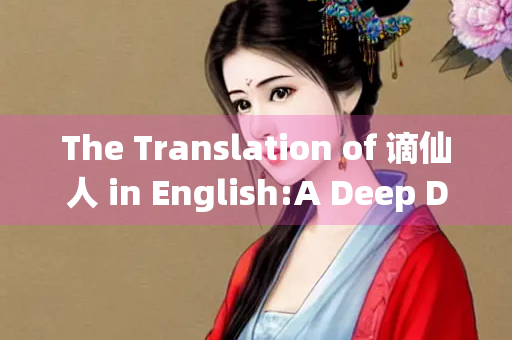The term "谪仙人" (zhé xiān rén) is a fascinating and cu lt urally rich Chinese phrase that carries deep historical, literary, and philosophical connotations. Translating it into English is not a straightforward task, as it involves navigating layers of meaning, cultural context, and poetic nuance. This article explores the possible translations of "谪仙人," examining its origins, interpretations, and the challenges of rendering it accurately in English. By the end, readers will gain a comprehensive understanding of how this term can be best conveyed in another language while preserving its essence.

Combined, "谪仙人" literally means an "exiled immortal" or "banished transcendent being." However, its connotations extend far beyond this direct translation.
The term is most famously associated with the Tang Dynasty poet Li Bai (李白), who was given the title "谪仙人" by the scholar-official He Zhizhang (贺知章). Legend has it that He Zhizhang, upon reading Li Bai’s poetry, exclaimed that he must be an immortal banished from heaven due to his extraordinary talent. This elevated Li Bai’s status to that of a celestial being living among mortals.
In Chinese literature, "谪仙人" thus embodies:
Translating "谪仙人" requires balancing literal meaning, cultural context, and poetic resonance. Several app roaches can be taken, each with strengths and limitations.
Given these considerations, the most balanced translations could be:
For Li Bai specifically, "The Banished Immortal Poet" effectively captures his legendary status.
The term has influenced Chinese literature, philosophy, and even modern pop culture. It represents:
"谪仙人" is more than just a phrase—it’s a cultural symbol. While no single English translation can fully capture its depth, "Banished Immortal" or "Celestial Exile" come closest. The best approach depends on context: scholarly works may prefer a literal translation, while poetry or literature might opt for a more evocative rendering.
Ultimately, translating such terms reminds us of the beauty and complexity of cross-cultural communication. Just as Li Bai’s poetry transcends time, the essence of "谪仙人" continues to inspire, whether in Chinese or English.
本文地址: https://www.shuiwy.com/a/106954.html
文章来源:im
版权声明:除非特别标注,否则均为本站原创文章,转载时请以链接形式注明文章出处。
2026-02-05im
2026-02-05im
2026-02-05im
2026-02-05im
2026-02-05im
2026-02-05im
2026-02-05im
2026-02-05im
2026-02-05im
2026-02-05im
2024-03-03im
2024-01-24im
2023-05-29im
2023-06-04im
2023-06-16im
2023-10-07im
2023-06-20im
2023-10-07im
2023-06-19im
2023-06-14im
2024-02-27im
2024-02-11im
2024-01-15im
2024-01-14im
2024-02-11im
2024-01-13im
2024-02-10im
2024-01-19im
2024-02-11im
2024-02-27im
扫码二维码
获取最新动态
